SaaS vs. Custom Software: Ultimate Guide for Your Business 2024
-

-
Shivendra Saxena
30 Oct, Mon
Content
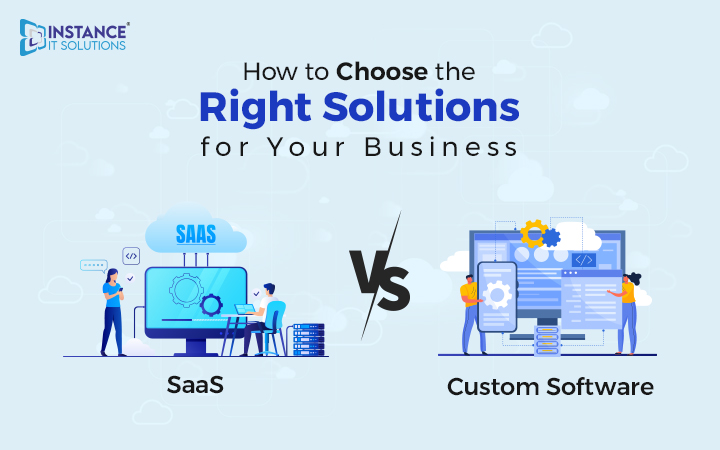
Introduction
Choosing the right solutions for your business is a critical decision that can significantly impact your company's success. In today's rapidly evolving business landscape, where technology, competition, and customer expectations are constantly changing, making informed decisions about the solutions you implement is more important than ever. Â
Steps On Choosing The Right Solution For Your Business
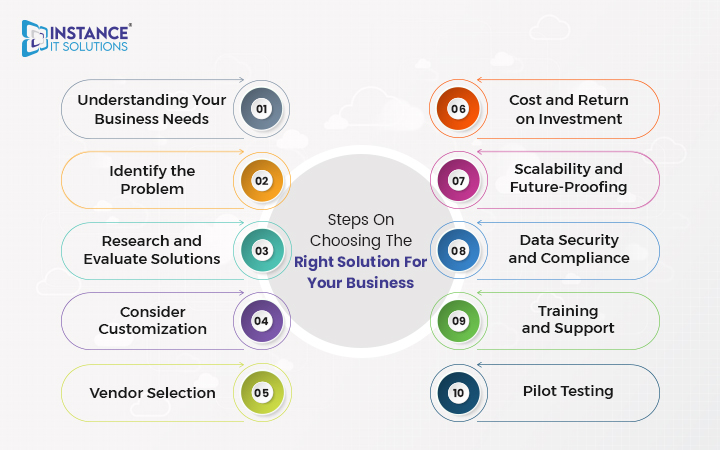 Understanding Your Business Needs Â
Understanding Your Business Needs Â
The first step in choosing the right solutions for your business is understanding your specific needs. This requires a thorough assessment of your current processes, challenges, and goals. Consider factors such as the size of your business, your industry, and the unique requirements that set you apart from your competitors. This initial understanding will serve as the foundation for your decision-making process. Â
Identify the Problem Â
Once you've grasped your business needs, it's time to identify the specific problems that need solving. Are you looking to improve operational efficiency, enhance customer experience, or streamline your supply chain? Pinpointing the issues will help you focus on solutions that directly address these challenges. Â
Research and Evaluate Solutions Â
With a clear understanding of your business needs and identified problems, it's time to research and evaluate potential solutions. This process involves exploring various options, such as software platforms, tools, or services. Consider factors like functionality, scalability, ease of implementation, and cost. Â
Consider Customization Â
While off-the-shelf solutions may meet some of your requirements, customizing a solution to align with your unique needs is often necessary. Customization can involve tailoring software or systems to fit your processes perfectly, ensuring they address your specific challenges. It's crucial to evaluate whether a solution can be adapted to suit your business requirements. Â
Vendor Selection Â
Once you've identified potential solutions, the next step is selecting the right vendor or provider. Take the time to research their reputation, track record, and customer reviews. Ensure the vendor aligns with your business values and can offer the support and expertise required for the successful implementation of the chosen solution. Â
Cost and Return on Investment Â
Cost is a significant factor in any business decision. Consider both the upfront costs and ongoing expenses associated with the solution. Evaluate the potential return on investment (ROI) by estimating how the solution will impact your business in terms of increased efficiency, revenue, or cost savings. A well-thought-out solution should offer a positive ROI over time. Â
Scalability and Future-Proofing Â
As your business grows, your needs will evolve. It's essential to choose solutions that are scalable and can adapt to your changing requirements. Avoid solutions that may become obsolete in a short period. Ensure that the solution can grow with your business and remain relevant in the future. Â
Data Security and Compliance Â
Data security and compliance are paramount, especially in today's digital age. Ensure that the chosen solution adheres to industry standards and regulations relevant to your business. Protecting sensitive data and maintaining compliance is crucial to avoid legal issues and safeguard your reputation. Â
Training and Support Â
Consider the training and support provided by the vendor to ensure a smooth implementation process. Comprehensive training for your team and ongoing support are essential to make the most of the chosen solution. Â
Pilot Testing Â
Before fully implementing a solution, conduct pilot testing to identify any potential issues or areas for improvement. This testing phase allows you to fine-tune the solution and ensure it aligns with your business needs. Â
Choosing the right solutions for your business is a complex process that requires a deep understanding of your specific needs and a methodical approach. Â
It's a decision that should not be rushed, as the consequences can be long-lasting. By following these steps and considering the factors mentioned, you can make informed decisions to drive your business forward and contribute to your long-term success.Â
SaaS Vs. Custom Software - What To Choose?
Software is an integral part of modern business operations, and the choice between Software as a Service (SaaS) and custom software solutions can significantly impact a company’s efficiency, scalability, and overall success. Each approach has its own set of advantages and drawbacks. Here, we'll explore the key differences between SaaS and custom software to help businesses make informed decisions based on their specific needs and requirements.Â
SaaS (Software as a Service)
SaaS refers to software that is hosted in the cloud and made available to users over the internet. It is typically provided on a subscription basis and accessed through a web browser. Examples of SaaS include customer relationship management (CRM) systems like Salesforce, collaboration tools like Microsoft 365, and project management platforms like Asana.Â
Advantages of SaaSÂ 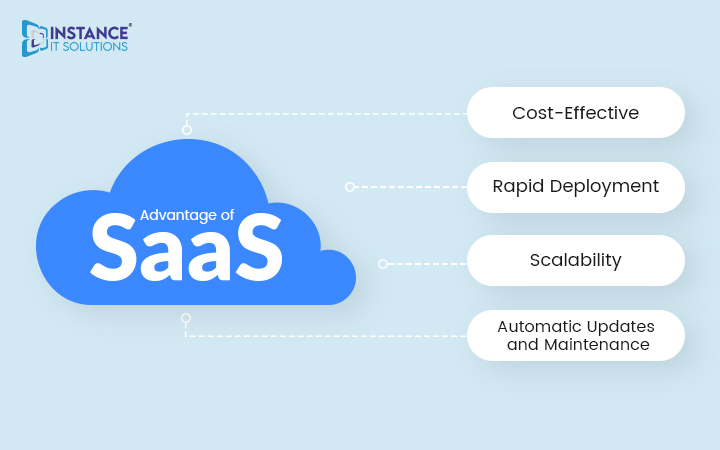
Cost-Effective Â
SaaS often follows a subscription model, where users pay a recurring fee. This eliminates upfront costs for hardware, software licenses, and maintenance. It can be more cost-effective for businesses, especially smaller ones with limited resources. Â
Rapid Deployment Â
SaaS solutions are readily available and can be quickly deployed without the need for extensive setup or installation processes. This allows businesses to start using the software almost immediately after subscribing. Â
Scalability Â
SaaS applications are usually designed to scale easily. Users can often adjust their subscription level to accommodate more users, increased data storage, or additional features as their business grows. Â
Automatic Updates and Maintenance Â
The responsibility for software updates, security patches, and maintenance lies with the SaaS provider. Users typically benefit from the latest features and enhancements without managing these updates themselves.Â
Custom Software
Custom software, as the name suggests, is specifically developed to meet the unique needs and requirements of a particular business. It is built from scratch and tailored to address specific challenges or processes within the company.Â
Advantages of Custom Software 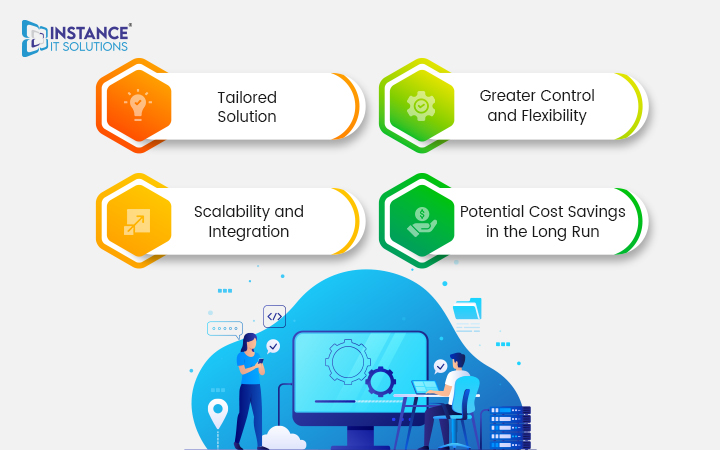
Tailored Solution Â
Custom software is designed to fit the exact needs of a business. It can address specific workflows, requirements, and challenges that off-the-shelf solutions might not accommodate. Â
Greater Control and Flexibility Â
Businesses have complete control over the features, integrations, and functionalities of custom software. This level of customization can result in a solution that aligns perfectly with the company's operations. Â
Scalability and Integration Â
As the software is built specifically for the business, it can be easily scaled and integrated with existing systems or future technologies. Â
Potential Cost Savings in the Long Run Â
While the upfront costs of custom software development may be higher, in the long run, businesses may realize cost savings by not paying recurring subscription fees and having a solution that precisely meets their needs.
Choosing Between SaaS and Custom Software
The decision between SaaS and custom software largely depends on the unique requirements and circumstances of the business:Â Â
Budget and Resources Â
Small to medium-sized businesses with limited budgets and resources may find SaaS solutions more cost-effective and easier to manage. Custom software development often requires more significant upfront investments and ongoing maintenance costs. Â
Specific Needs and Complexity Â
If a business has highly specific needs or operates in a niche industry that requires a unique approach, custom software may be the better option. SaaS solutions might not fully cater to highly specialized demands. Â
Speed of Implementation Â
SaaS solutions offer quicker implementation as they are already developed and ready to use. Custom software development, on the other hand, can take time to design, develop, test, and deploy. Â
Long-Term Vision and Flexibility Â
For businesses planning for long-term growth and aiming for complete control over their software's features and integrations, custom software might be the preferred choice. Â
Both SaaS and custom software have their strengths and weaknesses. The decision between the two depends on careful consideration of the business's specific needs, long-term goals, budget, and the importance of customization. Â
Some businesses may even choose a hybrid approach, combining both off-the-shelf and custom solutions to meet various needs within their organization. Ultimately, a thorough analysis of these factors is crucial in selecting the most suitable software solution for a business.Â
Conclusion
In the dynamic landscape of business technology, the choice between Software as a Service (SaaS) and custom software remains a critical decision that significantly influences a company’s operations and success. Each option offers distinct advantages and considerations that businesses must carefully weigh before making a decision. Â
SaaS solutions, with their subscription-based models and rapid deployment, provide accessible, cost-effective software for businesses of varying sizes. They offer scalability and regular updates and require minimal maintenance, making them an attractive choice for companies seeking quick and hassle-free implementation. Â
Conversely, custom software stands out for its tailored approach, providing precise solutions to complex and unique business needs. Offering complete control, flexibility, and the potential for long-term cost savings, custom software addresses the specific requirements of an organization in a way that off-the-shelf solutions often cannot. Â
The decision-making process ultimately hinges on understanding the individual needs, budget, and long-term vision of a business. Small to medium-sized enterprises with limited resources and straightforward requirements might find SaaS solutions more appealing due to their cost-effectiveness and rapid implementation. On the other hand, larger enterprises, or those with highly specialized needs, may opt for custom software to ensure their software aligns perfectly with their operations and future growth strategies. Â
Moreover, some businesses might adopt a hybrid approach, combining elements of both SaaS and custom solutions to leverage the benefits of off-the-shelf software while integrating custom-built applications for specific functions or processes. Â
In the rapidly evolving world of technology, the decision between SaaS and custom software is not merely a choice between two options but a strategic determination that can shape a company’s efficiency, innovation, and competitiveness. Â
Businesses must assess their unique requirements, long-term goals, and available resources, ensuring that their chosen software solution aligns seamlessly with their current and future needs, ultimately driving their success in the ever-changing business landscape.Â
We are trusted by over 650+ clients.
Join them by using our services and grow your business.
Request a callbackRequest a callback


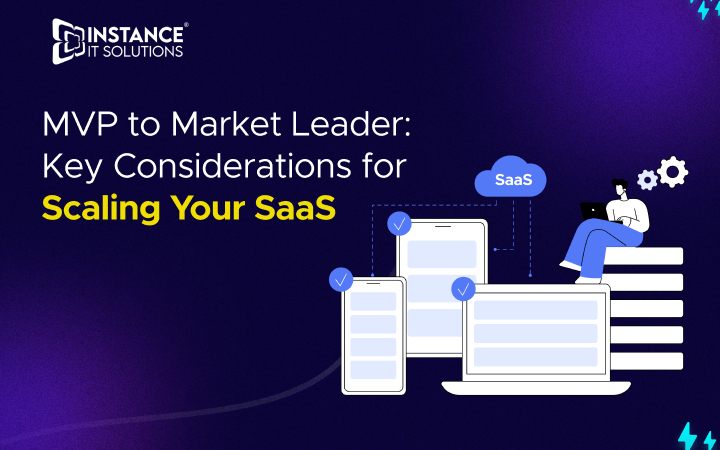
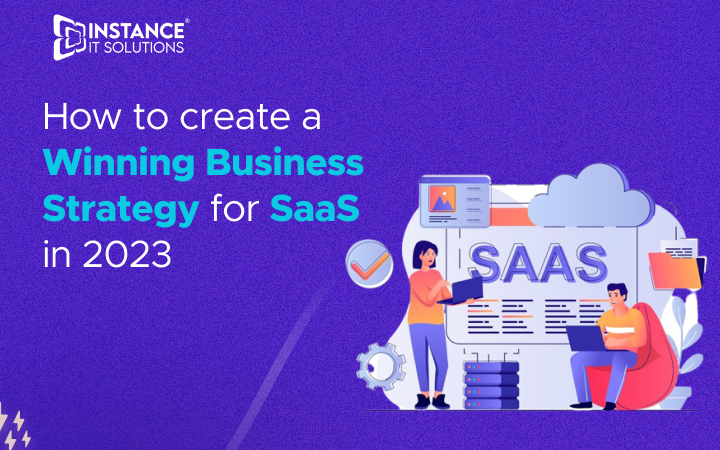
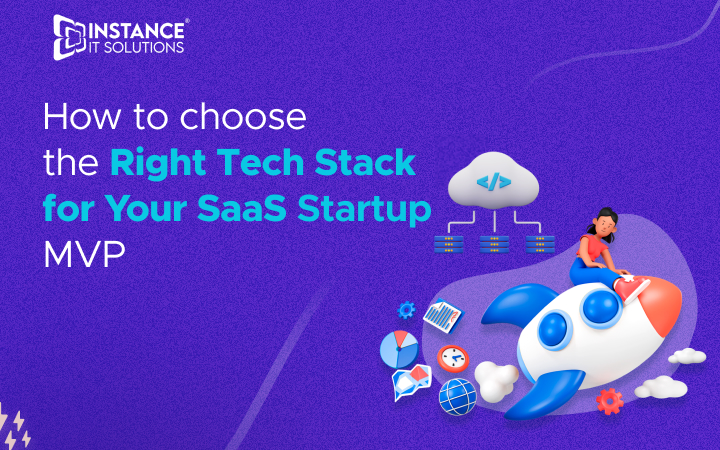
 Contact Us
Contact Us
